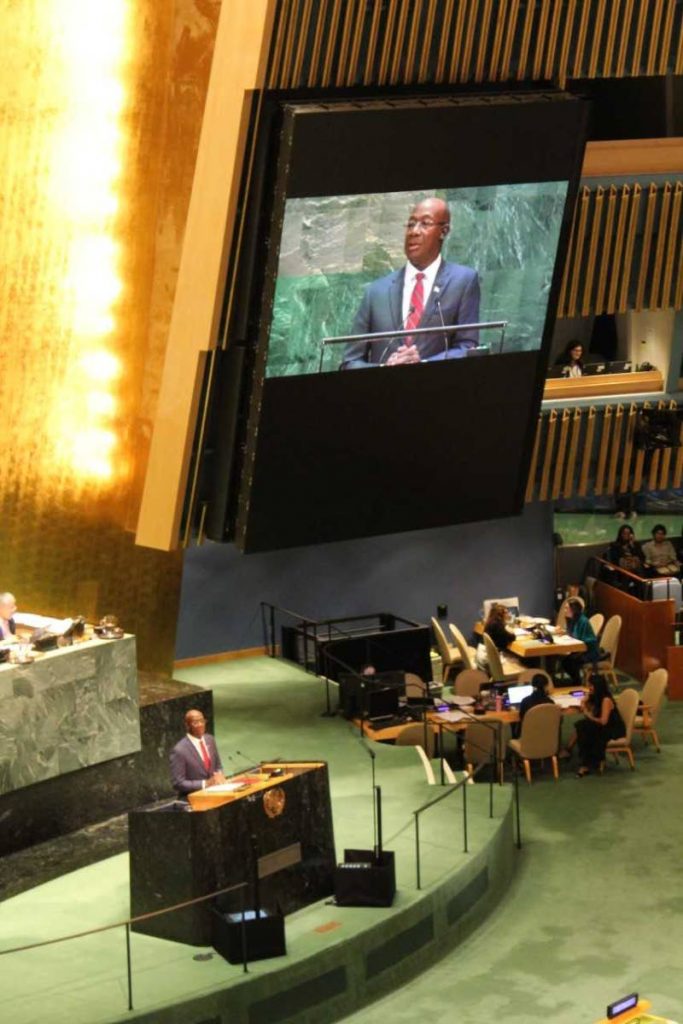Rowley highlights climate change, financial blacklisting

THE Prime Minister delivered his first address to the 74th United Nations General Assembly yesterday, reiterating to the world TT’s commitment to climate action, sustainable development, female empowerment, migration, financial inclusivity and international peace and security.
“We continue to note with alarm, the number of persons living in poverty, the innumerable threats posed by the effects of unmitigated climate change and the continued exclusion of the most vulnerable in our societies with respect to access to education, social protection and healthcare. Migration, violent extremism, the scourge of terrorism, the threat of violent conflict and the spread of communicable diseases...are pressing challenges that transcend the borders of individual countries.”
Dr Rowley stepped up to the iconic green marble podium in the UN General Assembly hall at about 7.15 pm. Like all of his Caribbean colleagues who spoke before him, he highlighted the deleterious effects of climate change on the Caribbean region – from extreme flooding, droughts, coral bleaching, rising sea levels, heatwaves and devastating hurricanes.
As another matter of regional concern, Dr Rowley highlighted the “unilateral insertion” of some Caricom countries, including TT, as non-cooperative tax jurisdictions. He called for a more “collaborative, just and fair” approach by international partners who have blacklisted the region with a label that “has the potential to inflict irreparable damage to the reputations and economies of small island developing states like ours.
“TT remains deeply concerned about the progressive decline in correspondent banking services by international banks. This is particularly problematic for Caricom as it threatens our financial stability, impedes our efforts to alleviate poverty and limits our achievements in respect of socio-economic growth and development.”
He also noted with concern that criminal activity has moved from random acts of criminality to sophisticated criminal networks. “These compounded challenges represent a threat to our socio-economic well-being, the rule of law and our peace and security.” Regarding violent extremism, he said the threat and effect of this phenomenon should be neither overlooked nor dismissed.
“The global threat of young people being lured by extremist groups remains a major concern.”
The Prime Minister reiterated the Caribbean’s role as a “zone of peace,” and the country – and region’s – desire for dialogue as a critical and indispensable conduit for the resolution of tensions in Venezuela. He said the country was in full support of the Montevideo Mechanism, which supported dialogue and free and fair elections in Venezuela. Noting the recent breakdown in talks, he said, the country was saddened to see one party pull out of talks but hoped it was only temporary. Only Venezuelans could properly take control of their situation, he said, and urged “external forces” not to further engage in unilateral intrusions that could potentially undermine negotiations.He noted the influx of Venezuelan migrants to TT as a challenge to the country’s sustainable development unless there is proper management of this “irregular migration.” He highlighted the recent migrant registration process as a way to safeguard human rights and humanitarian needs of Venezuelan migrants in TT, while also looking after this country’s national interests, including national security.
“As a responsible member of this family of nations, (TT) recognises our duty to assist our neighbours in their time of distress… despite our small size and very limited resources.”
There are both opportunities and challenges that come with migration, he said, and TT’s policy was rooted in respect and dignity, and “ensuring that empathy shines through as a beacon to the destitute.”


Comments
"Rowley highlights climate change, financial blacklisting"